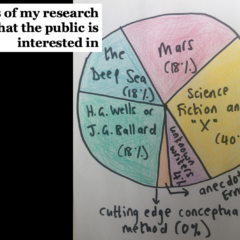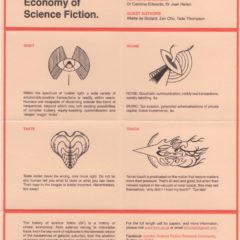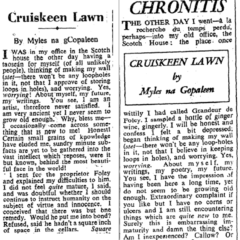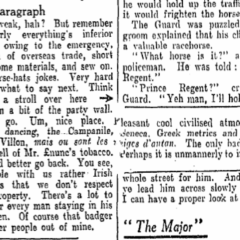Organic Systems: Session 3 – report
CHASE series: Organic Systems Workshop 3: Ecologies of Gender Report by Dr Sean O'Brien (Birkbeck, University of London) After a brief introduction and recap of previous sessions, in which Dr Joseph Brooker (Birkbeck, University of London) discussed the increasing awareness of ecology as a critical issue and noted the emerging interest in SF as a critical field with certain capacities for addressing pressing ecological questions and concerns, the group considered a set of questions posed by Dr Caroline Edwards (Birkbeck, University of London) that were designed to help incorporate feminist thinking and gender politics into the discussion of SF and ecology. These questions included: ‘How is feminist thinking valuable for thinking about the environmental and issues of ecological equality and futurity?’ ‘What happens if we ignore gendered experiences of when thinking about environmental issues like climate change?’, and ‘Can SF function as a method, rather than a literary or cultural mode of production [that could] help us address ecological issues?’ Dr Edwards then ran a PhD training session on ‘Public Engagement: Communicating SF Research to the General Public’. Dr Edwards began by problematizing the term ‘general public’, noting that the public is not only more accurately described as publics plural but also, and perhaps more importantly, is a space characterized by divergent backgrounds and a multiplicity of knowledges. Dr Edwards has spoken at a wide variety of public eventshosted by venues such as The Wellcome Trust, Deptford Cinema and Radio 4, and her work has appeared in a number of public outlets, including The Guardian and SFX. She has also staged public exhibitions, including Imagined Futures at the Museum of London, which was recognized in Birkbeck’s Public Engagement Awards, 2018. Over the course of her career, Dr Edwards discovered that her academic interests don’t always translate well for a mixed audience. The research forthcoming in her monograph, Utopia and the Contemporary British Novel (Cambridge University Press, 2019), develops cutting edge conceptual methods from Science Fiction Studies and Utopian Studies for reading a number of lesser-known contemporary British authors. This work has not been picked up by public media as has her work on Mars, the deep sea, the work of H. G. Wells and J. G. Ballard, or various topics she has placed in conversation with Science Fiction. The task then for researchers keen to disseminate their work to the public is to contextualize their research interests using broader topics of public interest, especially thematic and historic contexts. Dr Edwards emphasized that the timelines for public appearances tend to be rather tight, and so it’s important to think about how to use your time wisely and make the work...
Organic Systems: Session 2 – report
On Thursday 23rd May 2019, we held the second workshop in our series Organic Systems, which is supported by CHASE, the Consortium for the Humanities and the Arts in South-East England. This episode of our collaboration between Birkbeck and Goldsmiths took place in Birkbeck’s Cinema. A sizeable audience came along, including CHASE PGR students and also interested members of the public who had seen the event advertised as part of Birkbeck’s annual Arts Week. Like other events in the series, the workshop had the following aims: To provide beneficial research expertise from guest speakers in designated training sessions. To hold round-table sessions in which guest speakers with strong research interests and expertise will present and discuss ideas – with contributions also welcome from the registered participants. To encourage meeting and networking among scholars in related areas, leading to the development of this research area. After a general introduction to the themes of the series, we heard from Dr James Machin, currently based at the Royal College of Art, who discussed his experience of applying for and undertaking research fellowships in fantastic literature. James successfully applied for grants to visit the Harry Ransom Centre in Austin, Texas and the University of California at Riverside. His research was not on science fiction as such but on early instances of ‘weird fiction’, overlapping with horror and Gothic, notably the writing of H.P. Lovercraft and John Buchan’s lesser-known work in this field. James showed us his applications on screen, and gave advice on making them successful. In particular, he said, be thorough, and argue the case that the archive in question is crucial to your research, which couldn’t be completed without it. In response to questions, James also described the experience of working in an archive and the thrill of encountering original material that has rarely if ever been viewed before. The second part of the day was an extended panel discussion with three speakers: Sean Cubitt of Goldsmiths; Katie Stone, who is undertaking a PhD on science fiction at Birkbeck; and Francis Gene-Rowe, who is completing his studies at Royal Holloway. The panel was chaired by Aren Roukema who is completing a PhD on science fiction and religion at Birkbeck. Sean gave a fascinating presentation involving clips from the films Source Code (2011) and Déja Vu (2006), exploring the interaction between sound and image and their construction of virtual worlds. Katie and Francis then produced more of a dialogue between two streams of thought that were supported by an extensive series of slides, headed The Strange Ecologies of Science Fiction. Films mentioned and glimpsed included the recent Avengers blockbuster and other superhero...
Call for Papers: Productive Futures: The Political Economy of Science Fiction
Conference: 12-14 September 2019 Deadline for Abstracts: 31 May 2019 Keynote speakers: Dr. Caroline Edwards (Birkbeck), Dr. Joan Haran (Cardiff University) Guests of honour: Aliette de Bodard, Zen Cho, Tade Thompson The history of science fiction (SF) is a history of unreal economics: from asteroid mining to interstellar trade, from robotic workforces to utopian communes, from the abolition of money and property to techno-capitalist tragedies of the near future. The London Science Fiction Research Community (LSFRC) invites abstracts of 300 words, plus 50 word bios, addressing economic themes in SF, and/or exploring how SF can help to widen and evolve our sense of the economic. Please submit to lsfrcmail@gmail.com by 31st May 2019. As the global economy is transformed by AI and automation, the economic themes of SF grow considerably more visible in everyday political discourse. Although capitalist liberal democracy continues to present itself as only reasonable option for ordering complex modern societies, SF offers a rich alternative tradition in which core capitalist institutions – money, finance, market, state, class, law, family – are fantastically permutated or abolished altogether. And, while mainstream economics tends to frame technological innovation as unproblematic progress – driving productivity, growth, and prosperity – SF has a much more critical and flexible understanding of how technology relates to everyday economic life. Economics often likes to believe that it is about everything and anything. What do we spend our days doing? What gets made, and how? Who gets to own, use, and consume resources? Who works, and how, and why? Why are some things valued more than others? The reality is, the models of mainstream economics are established on a set of exclusions. Intricate social and cultural institutions are swept to one side, as though they either don’t matter, or are so natural and immutable that they can be taken for granted. Socially reproductive labour and affective labour is obscured, as are the histories of colonial war and appropriation on which most modern wealth is founded. Any understanding of economic systems as structured around the intricate network of intersecting, generative identities of the people whose labour, and frequently whose bodies, constitute it, is dispensed with. Instead we are presented with Homo economicus, the egoist agent pursuing its (frequently his) fixed set of interests. And the complex ecological connectivity of the more-than-human world is reduced to ‘natural capital,’ merely another input into the production process. But many SF works – from Samuel Delany’s Triton, Ursula K. Le Guin’s The Dispossessed, Pamela Zoline’s ‘The Heat Death of the Universe’, Joanna Russ’s The Female Man, Octavia Butler’s Parables series, to Kim Stanley Robinson’s New York 2140 – radically challenge the narrowness of these visions. Such works reconnect...
Chronitis
Myles na gCopaleen à la recherche du temps perdu by Tobias Harris This article first appeared in the Modernist Review blog in 2016. Since it is no longer available there, we republish it here in advance of our Birkbeck Arts Week 2019 session, ’Irish Times: Myles na gCopaleen's Cruiskeen Lawn' which takes place at 7:40pm on 21st May in the Birkbeck School of Arts. Register for your free place to attend here. *** Brian O’Nolan (1911-1966) was an Irish writer who is now mainly referred to by his pseudonym Flann O’Brien, and known for his novels At Swim-Two-Birds (1939) and The Third Policeman (1967). However, in his lifetime he was far better known as Myles na gCopaleen, the name under which he published the satirical Cruiskeen Lawn several times a week in the Irish Times for a quarter of a century (as well as his novel, An Béal Bocht/The Poor Mouth, in 1941, and his plays, Faustus Kelly and The Insect Play, in 1943). Cruiskeen Lawn runs to something like four million words. Modern readers are likely to encounter it in one of several slimmed-downed compilations produced after his death, but on two occasions O’Nolan chose to reprint anthologies of Cruiskeen Lawn himself. First in 1943, he published a bilingual anthology which, as Steven Curran has argued in Éire-Ireland, sharpens its focus on the figure of Myles as a satirist and bears a mock newspaper front cover declaring: 'Myles na gCopaleen Crowned King of Ireland'. The second occasion was in 1959-1960, when O’Nolan republished about sixty columns in four numbers of a short-lived periodical which was called Nonplus, edited by the novelist Patricia Murphy (née Avis). The older O’Nolan also preserves a particular flavour of Cruiskeen Lawn by favouring some types of column over others. Whilst the character known as The Brother appears here and there and Keats and Chapman feature twice, just as in 1943, the republished columns are predominantly complex and multilingual satirical sallies into heavyweight topics: aesthetics, language, literature, politics and the national culture. (I should note that it has been suggested that many of the more ‘literary’ columns were written by co-author Niall Montgomery.) Some of this reprinted Nonplus material had already been published not once, but twice. This creates unusual effects. One such doubly reprinted column appeared first in 1946 (and this is the version that O’Nolan republishes in Nonplus, but more on that later) and again in 1958. It’s a set of preoccupations about posterity and maturity combined with strange recollections on time that turns into a plagiarising pastiche of the theories of W. B. Yeats. Sufficiently interested? Okay, I’ll try to summarise. On 7...
Organic Systems: SF & Ecology on Screen
Organic Systems: Science Fiction & Ecology Today Session 2: SF & Ecology on Screen (Birkbeck Cinema): 23rd May 2019 Organic Systems is a series of four workshops on Science Fiction and Ecology, aimed primarily at postgraduate research students and supported by CHASE, the Consortium for the Humanities and the Arts in South-East England. The series is a collaboration between Birkbeck and Goldsmiths, two colleges of the University of London, and specifically between the Centre for Contemporary Literature (Birkbeck) and the Critical Ecologies research strand (Goldsmiths). Each workshop has the following aims: * To provide beneficial research expertise from guest speakers in designated training sessions. * To hold round-table sessions in which guest speakers with strong research interests and expertise will present and discuss ideas – with contributions also welcome from the registered participants. * To encourage meeting and networking among scholars in related areas, leading to the development of this research area. The second of the four workshops will be held at Birkbeck on Thursday 23rd May 2019. The programme will be as follows: 2-3: PhD Training session (BBK Cinema): ‘Fellowships in Fantastic Fiction’ with Dr James Machin (former Visiting Fellow at the University of Riverside, California and Harry Ransom Centre, Texas). 3:30-5: Panel (BBK Cinema): ‘SF and Ecology on Screen’. Speakers including Sean Cubitt (Goldsmiths), Katie Stone (Birkbeck), Francis Gene-Rowe (Royal Holloway). As well as registering with CHASE, please reserve your free place for this afternoon's session here so that we can manage attendance in this venue. 5-6: Reception outside BBK Cinema. 6-9: Screening of Solaris (1972, dir. Andrei Tarkovsky) in Clore Lecture Theatre, Birkbeck, introduced by London Science Fiction Research Community. Please book a free ticket for this screening here. Image by Andrey Sansonov, used under a CC BY-NC-ND licence....
Irish Times: Myles na gCopaleen’s Cruiskeen Lawn
Tuesday 21st May 2019 7.40-9pm | Book your ticket Keynes library, 43 Gordon Square Ireland's peerless comic writer Flann O'Brien was also known as the irascible Myles na gCopaleen, under which name he published the anarchic Cruiskeen Lawn column in the Irish Times between 1940 and 1966. In this special event for Birkbeck's Arts Week 2019, Birkbeck's Tobias Harris and Joseph Brooker will tread Myles’s elaborate multilingual labyrinth, with the help of reader Hugh Wilde. Image: Cruiskeen Lawn, 1st March...









Recent Comments